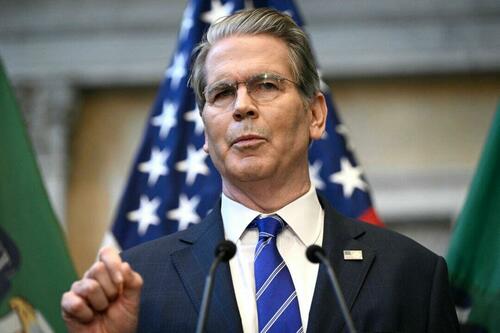China 'Made A Real Mistake' With Rare Earth Threats: Bessent
Authored by Tom Ozimek via The Epoch Times (emphasis ours),
Treasury Secretary Scott Bessent said China “made a real mistake” by threatening to restrict exports of rare earth minerals, adding that Beijing’s move has jolted the United States and its allies to fast-track efforts to secure new sources within the next two years.
 Treasury Secretary Scott Bessent speaks on the sidelines of the IMF/World Bank annual meetings, in Washington, on Oct. 15, 2025. Brendan Smialowski/AFP
Treasury Secretary Scott Bessent speaks on the sidelines of the IMF/World Bank annual meetings, in Washington, on Oct. 15, 2025. Brendan Smialowski/AFPIn an interview published by the Financial Times on Oct. 31, Bessent said China had drawn global attention to its willingness to use critical minerals as leverage.
“China has alerted everyone to the danger. They’ve made a real mistake,” he told the newspaper.
“It’s one thing to put the gun on the table. It’s another thing to fire shots in the air.”
China imposed new controls on the export of technologies and materials linked to rare earth elements in early October. The restrictions rattled markets, upended supply chains, and became a major sticking point in trade negotiations between Washington and Beijing.
Following this week’s meeting between President Donald Trump and Chinese leader Xi Jinping on the sidelines of the Asia-Pacific Economic Cooperation (APEC) summit in South Korea, China announced that it would suspend the restrictions for one year.
“I think the Chinese leadership were slightly alarmed by the global backlash to their export controls,” Bessent told the Financial Times.
The Treasury chief said the United States and China had reached an understanding that would stabilize relations in the near term, while expressing the conviction that Beijing’s influence in the critical minerals sector would quickly fade.
“There’s an agreement that, ceteris paribus, we have reached an equilibrium, and we can operate within that equilibrium over the next 12 months,” Bessent said.
“I don’t think they’re able to do it now because we have offsetting measures.”
He said that China’s ability to use rare earths as a coercive tool would not last more than a 12- to 24-month period, underscoring the Trump administration’s efforts to diversify the U.S. supply chain through new mining and refining operations, including through partnerships in Southeast Asia and allied countries.
The suspension of Beijing’s controls also extends beyond U.S. markets.
European Union Trade Commissioner Maros Sefcovic said on Nov. 1 that Chinese officials at the Ministry of Commerce informed their European counterparts that the pause also applies to the EU.
“China confirmed that the suspension of the October export controls applies to the EU,” Sefcovic wrote on X, adding that “both sides reaffirmed commitment to continue engagement on improving the implementation of export control policies.”
Rare Earth TensionsChina first weaponized rare earths by imposing export controls on Japan during a diplomatic dispute in 2010, sending shockwaves through the global manufacturing sector. The rare earths sector remains one of the world’s most concentrated supply chains, with China dominating approximately 70 percent of global production and a significantly larger share of processing capacity.
Starting in 2023, China began imposing export restrictions on strategic materials to the United States, including substances like antimony, germanium, and tungsten. This prompted the Select Committee on the Strategic Competition between the United States and the Chinese Communist Party to release a report recommending that Congress incentivize domestic production of rare earth element magnets, which are the key end-use for rare earth elements.
Since taking office for a second term, President Donald Trump has sought to boost domestic production of strategic materials, including by fast-tracking permitting for critical mineral mining projects and pledging hundreds of millions of dollars to U.S. producers as his administration seeks to break China’s grip on supply.
In April 2025, China expanded its export control list to include seven rare earths and magnets made from three of them. This followed Trump’s steep tariffs on Chinese goods as part of efforts to rebalance what his administration calls unfair trade relations, as well as to curb the flow of fentanyl into the United States.
Since then, volatility in rare earth shipments to the United States has intensified, though a July framework between Washington and Beijing briefly eased tensions by providing a 90-day tariff pause meant to stabilize flows.
In September, Bessent said that the United States was “not without levers” in the rare earths dispute with China, noting that there were “plenty of products that they depend on us for,” including aircraft engines, parts, chemicals, plastics, and silicon ingredients.
In mid-October, the Treasury chief noted that rare earth shipments from China had once again slowed and said that it was the United States’ priority to work with allies to “de-risk and diversify supply chains away from China as quickly as possible.”
While Bessent said at the time that it was not the Trump administration’s desire to sever trade ties entirely with Beijing over the dispute of supplies of critical materials, he said that the United States and its allies may have no choice but to “decouple” if China “wants to be an unreliable partner to the world.”
* * * Top selling supplements
Creatine (sold out)
Astaxanthin (sold out but more arriving next week, accepting orders to ship Thurs+)
Colostrum (Grass-fed, pure, 25% IgG)
Peak Focus (Nootropic, 5 key ingredients for laser focus)
Neuro Ignite (NAC, Vitamins C & B6, Magnesium, Taurine, Glycine, Creatine)
Smart Protein (3 types of collagen peptides, 22.5g-24.5 of protein per serving)
Loading recommendations...